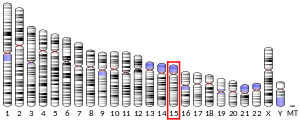Elongation factor RNA polymerase II-like 3 is a protein that in humans is encoded by the ELL3 gene.[5]
References
edit- ^ a b c GRCh38: Ensembl release 89: ENSG00000128886 – Ensembl, May 2017
- ^ a b c GRCm38: Ensembl release 89: ENSMUSG00000027246 – Ensembl, May 2017
- ^ "Human PubMed Reference:". National Center for Biotechnology Information, U.S. National Library of Medicine.
- ^ "Mouse PubMed Reference:". National Center for Biotechnology Information, U.S. National Library of Medicine.
- ^ "Entrez Gene: Elongation factor RNA polymerase II-like 3".
Further reading
edit- Takahashi H, Parmely TJ, Sato S, Tomomori-Sato C, Banks CA, Kong SE, Szutorisz H, Swanson SK, Martin-Brown S, Washburn MP, Florens L, Seidel CW, Lin C, Smith ER, Shilatifard A, Conaway RC, Conaway JW (July 2011). "Human mediator subunit MED26 functions as a docking site for transcription elongation factors". Cell. 146 (1): 92–104. doi:10.1016/j.cell.2011.06.005. PMC 3145325. PMID 21729782.
- Park G, Gong Z, Chen J, Kim JE (April 2010). "Characterization of the DOT1L network: implications of diverse roles for DOT1L". The Protein Journal. 29 (3): 213–23. doi:10.1007/s10930-010-9242-8. PMID 20431927. S2CID 38143958.
- Miller T, Williams K, Johnstone RW, Shilatifard A (October 2000). "Identification, cloning, expression, and biochemical characterization of the testis-specific RNA polymerase II elongation factor ELL3". The Journal of Biological Chemistry. 275 (41): 32052–6. doi:10.1074/jbc.M005175200. PMID 10882741.
- Law IK, Liu L, Xu A, Lam KS, Vanhoutte PM, Che CM, Leung PT, Wang Y (May 2009). "Identification and characterization of proteins interacting with SIRT1 and SIRT3: implications in the anti-aging and metabolic effects of sirtuins". Proteomics. 9 (9): 2444–56. doi:10.1002/pmic.200800738. PMID 19343720. S2CID 22613066.



